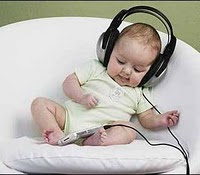 For those of you who have babies, it never hurts to stimulate your baby with music. Actually not much different to stimulate baby while still in the womb. However, the baby has been able to explore more because they already can see, hear and move. For those of you who are interested follow the way of stimulating, the following ways:
For those of you who have babies, it never hurts to stimulate your baby with music. Actually not much different to stimulate baby while still in the womb. However, the baby has been able to explore more because they already can see, hear and move. For those of you who are interested follow the way of stimulating, the following ways:- If fetal like slow music, a baby was more like music a rhythm faster.
- Play music through a variety of media with medium volume. Mom can customize it according to the conditions and area of the room.
- Stimulation can be done when your child awake, such as after meals, after a bath, and finished playing. Choose own time and, if it chose, try to provide continuous stimulation at these times that maximize results.
- Let out 1-3 type of music or more if the baby is still comfortable. The overall duration of about 30 minutes.
- Give your baby the opportunity to move and mumble (mumbling), maybe he enjoys the sound of music and appreciation through movements and sounds. We recommend that you put it in the mattress so he could move freely.
- If your baby can stand, let him shake his body as if dancing.
- Very good when we go humming or take the baby to move their arms and legs, such as by clapping their hands. Of course what we do must not damage the concentration of baby listening to music. The focus of his hearing fixed to the
1. Stimulating the right brain, enhance creative thinking
2. Reduce stress and pressure
3. Keeping mind, body and your soul
4. Stabilize the heart rate, blood pressure and body temperature.
Mozart music can strengthen your memory faster 3 months in infants. Mozart can increase the ability to talk to the baby, sharpening the left brain development, for a baby can calm him down in his mother's womb, can make the mother to be relaxed, and very much more the benefits of listening to classical music. To get the benefits and the relationship of classical music for babies can be found on websites or other blogs.









